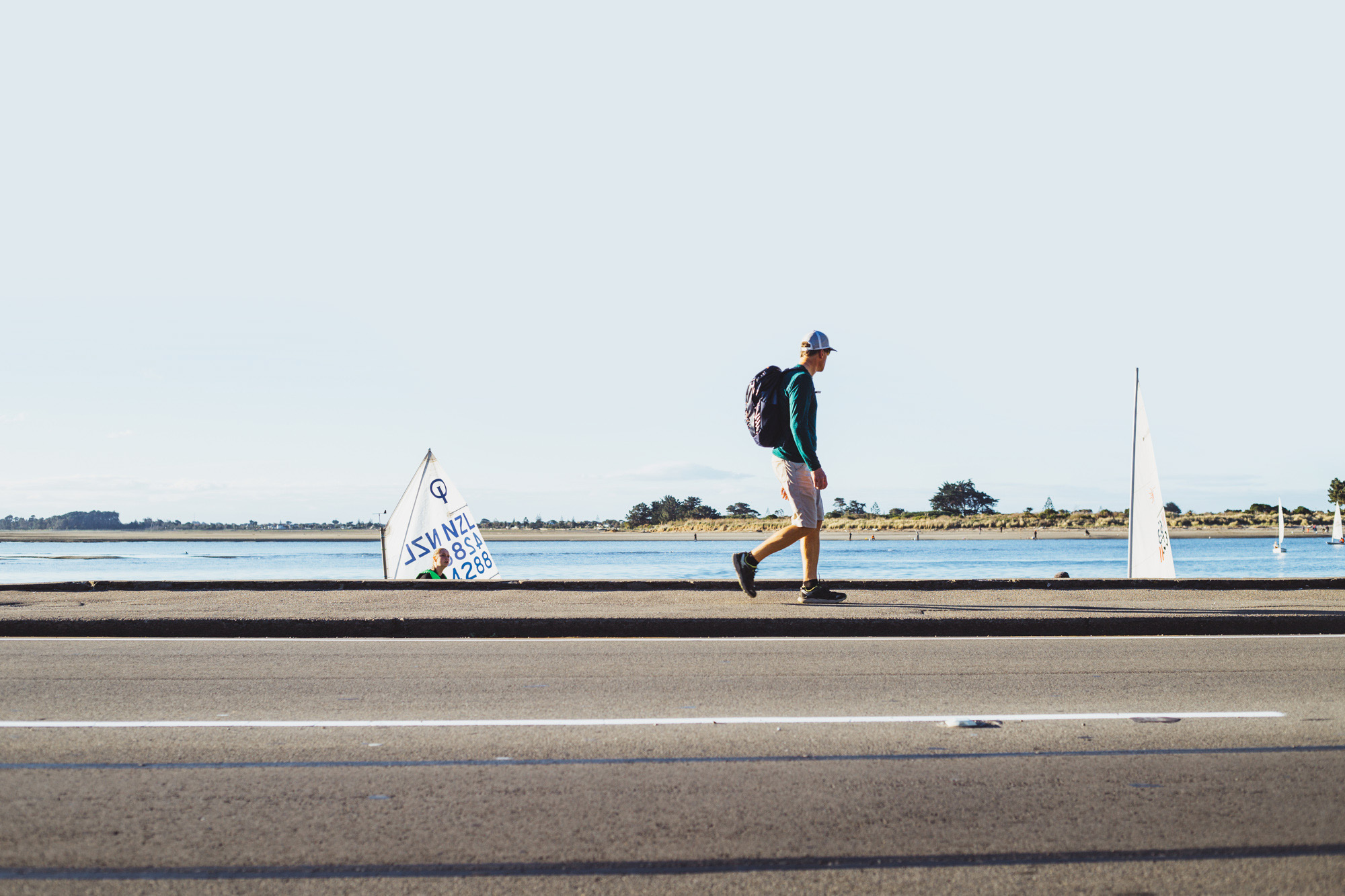
The award-winning Christchurch Coastal Pathway is a 6.5km shared path linking the southeastern suburbs. It stretches from Ferrymead Bridge to Scarborough Park at Sumner Beach. This world-class pathway connects people, land and sea, offering locals and visitors a vibrant space to enjoy the outdoors together.
Sections
The Coastal Pathway runs from Ferrymead Bridge to Scarborough Park. It includes the following sections:
Ferrymead Bridge to Mt Pleasant Community Centre “Scott Park”: 1.1km
Mt Pleasant Community Centre to Redcliffs School “Causeway:1km
Redcliffs School to Tram Shelter “Beachville Reserve”:1.45km
Tram Shelter to Shag Rock “Moncks Bay”:0.85km
Rapanui/Shagrock to Cave Rock “Peacock’s Gallop”:0.9km
Cave Rock to Scarborough Park “Sumner Beach”:1.2km
Amenities
Scott Park, just after Ferrymead Bridge, offers parking, water, toilet, picnic area, the restored Cob Cottage and a bus stop
Mt Pleasant Community Centre offers parking, water, toilets, events and a cafe
The section near Redcliffs School offers street parking, beach access, picnic spots, and a gravel section through a reserve
The eastern section of Beachville Road offers picnic and play spaces, views of bird islands at low tide, and is a popular fishing area
The town of Redcliffs, near the Tram Shelter, offers street parking, cafes, shops and a bus stop
Parts of the Moncks Bay segment are cantilevered over the Estuary and feature art, a yacht club, views of birds including Godwits and a small beach
Peacock’s Gallop runs parallel to the beach, ending at the Sumner Surf Life Saving Club with an elevated wooden plank section with parking, water, toilets and events
Cave Rock has parking, caves to explore, a fantastic beach and access to Sumner’s cafes, restaurants and shops
The “Sumner” segment runs parallel to the beach with plenty of parking, bus stops, toilets and access to the beach
Scarborough Park marks the eastern end with parking, toilets, cafe, playground and waterpark
Grade
The pathway is an easy-grade, wide and level trail. Most of the path is asphalt with sections that include a segment cantilevered over the estuary, a gravel segment through an eco-reserve, and an elevated wooden plank area. Most people can comfortably walk at a pace of 4-6km/hr. This 4-meter-wide, international standard shared use pathway accommodates a range of activities, including walking, running, cycling, skateboarding, skating and scooting.
Using the Pathway
The Coastal Pathway is a popular place to visit in Christchurch, please be considerate of others at all times so the pathway is a great place for everyone to enjoy. The following are our recommendations to ensure this happens
All users:
Keep left when moving on the pathway
If in a group, leave space for others to pass you
Please keep children in front of you and in clear view
It is a recreational pathway with many different users (elderly folk, young children, people playing, fishing, watching wildlife) so give everyone space to enjoy the pathway in the way they choose.
Look behind you before changing your direction
Keep dogs on a leash
People on vehicles (bikes, scooters, skateboards, roller blades)
Fast moving users are scary and a risk to other users, please ride considerately at all times
If you intend to commute at speed by bike the road cycle lanes may be a better option, especially when the pathway is busy
It is good practice to use your bell as a warning
Slow down when passing other users
Go very slow (walking pace only) through the shop/cafe areas in Redcliffs and Sumner and slow (15kph or less) through areas marked as slow speed or with driveways
Road rules apply so cyclists must wear helmets
Always be prepared for the unexpected when others are on the pathway
The Pathway as a Destination
The Christchurch Coastal Pathway has become an iconic attraction and a key reason to visit and stay in the city. It offers locals and tourists a unique way to explore Christchurch while linking to other tracks and attractions. This multi-purpose facility promotes health, fitness, and sustainable transport, with opportunities for running, cycling, skateboarding, walking, kayaking, surfing, windsurfing, and birdwatching along the scenic esplanade. It runs along the Te Ihutai estuary, an internationally recognized migratory bird habitat that supports diverse birdlife, including migratory godwits. The pathway attracts over a million users annually making it Christchurch’s second most visited attraction after the Botanic Gardens.
Design and Build
The Christchurch Coastal Pathway was designed to complement the estuary and coastal environment while honoring the rich Maori and European history. Originally envisioned by local residents, the project was managed through a partnership between the Christchurch City Council, the local Community Board and the Christchurch Coastal Pathway Group. Funding came from a mix of sources, including the Christchurch City Council, central government, sponsors and community donations. Major sections were constructed by contractors SCIRT and Fulton Hogan while the Coastal Pathway Group led fundraising efforts and coordinated the installation of furniture, artwork and landscaping in cooperation with the local communities.
Special care was taken during construction to protect archeological sites and local wildlife, with particular attention to the preservation of white-flippered penguins.
History
February 2011: Large parts of Christchurch were destroyed in a 6.3 earthquake, 185 dead,7000 injured
September 2011: Volunteers form the Christchurch Coastal Pathway Group (CCPG) to explore building the pathway to “build back better”
October 2012: Wraight & Associates present “Draft Concept Design and Feasibility Report”
June 2013: Christchurch City Council votes to commit $9.9M towards the Coastal Pathway
May 2015: Scott Park and Causeway sections opened
February 2018: Peacock Gallops section opened
June 2020: Central Government awards $15.8M in “Shovel Ready Funding” to complete the Pathway
November 2023: Moncks Bay section opened
September 2024: Sumner section resurfaced and improved
Recreation for everyone
This multi purpose facility promotes health, fitness and sustainable transport. There are lots of things to see and do along the esplanade. Running, cycling, skateboarding, walking, kayaking, surfing, windsurfing and birdwatching.
Nature's habitat
The estuary is a significant habitat for a high diversity of bird life and migratory birds, there is also an abundance of marine species. The pathway includes storm water management systems and native planting helps provide increased habitat for local and migratory wildlife.
Economic regeneration
The pathway is a significant and accessible outdoor recreational development in Canterbury- a beautiful esplanade. The pathway is the second most visited attraction in the city, after the Botanic Gardens attracting an estimated 1 million plus users a year.
For the people
The pathway is a new icon of our rebuilt city and a compelling reason to visit and stay. The pathway links back to the CBD, providing locals and tourists with a unique way to explore the city. The pathway also link to many other tracks and attractions.
Follow Christchurch Coastal Pathway on Facebook





